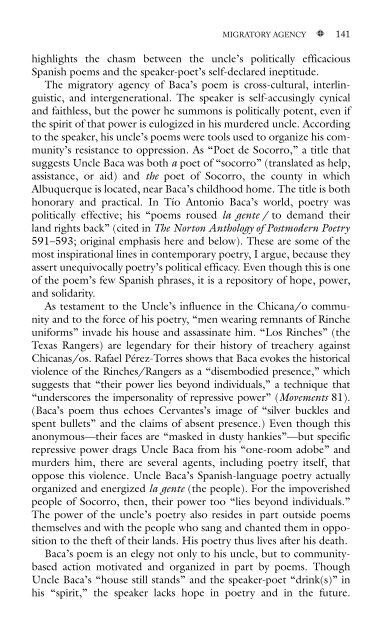american political poetry in the 21st century - STIBA Malang
american political poetry in the 21st century - STIBA Malang
american political poetry in the 21st century - STIBA Malang
Create successful ePaper yourself
Turn your PDF publications into a flip-book with our unique Google optimized e-Paper software.
MIGRATORY AGENCY 141<br />
highlights <strong>the</strong> chasm between <strong>the</strong> uncle’s <strong>political</strong>ly efficacious<br />
Spanish poems and <strong>the</strong> speaker-poet’s self-declared <strong>in</strong>eptitude.<br />
The migratory agency of Baca’s poem is cross-cultural, <strong>in</strong>terl<strong>in</strong>guistic,<br />
and <strong>in</strong>tergenerational. The speaker is self-accus<strong>in</strong>gly cynical<br />
and faithless, but <strong>the</strong> power he summons is <strong>political</strong>ly potent, even if<br />
<strong>the</strong> spirit of that power is eulogized <strong>in</strong> his murdered uncle. Accord<strong>in</strong>g<br />
to <strong>the</strong> speaker, his uncle’s poems were tools used to organize his community’s<br />
resistance to oppression. As “Poet de Socorro,” a title that<br />
suggests Uncle Baca was both a poet of “socorro” (translated as help,<br />
assistance, or aid) and <strong>the</strong> poet of Socorro, <strong>the</strong> county <strong>in</strong> which<br />
Albuquerque is located, near Baca’s childhood home. The title is both<br />
honorary and practical. In Tío Antonio Baca’s world, <strong>poetry</strong> was<br />
<strong>political</strong>ly effective; his “poems roused la gente / to demand <strong>the</strong>ir<br />
land rights back” (cited <strong>in</strong> The Norton Anthology of Postmodern Poetry<br />
591–593; orig<strong>in</strong>al emphasis here and below). These are some of <strong>the</strong><br />
most <strong>in</strong>spirational l<strong>in</strong>es <strong>in</strong> contemporary <strong>poetry</strong>, I argue, because <strong>the</strong>y<br />
assert unequivocally <strong>poetry</strong>’s <strong>political</strong> efficacy. Even though this is one<br />
of <strong>the</strong> poem’s few Spanish phrases, it is a repository of hope, power,<br />
and solidarity.<br />
As testament to <strong>the</strong> Uncle’s <strong>in</strong>fluence <strong>in</strong> <strong>the</strong> Chicana/o community<br />
and to <strong>the</strong> force of his <strong>poetry</strong>, “men wear<strong>in</strong>g remnants of R<strong>in</strong>che<br />
uniforms” <strong>in</strong>vade his house and assass<strong>in</strong>ate him. “Los R<strong>in</strong>ches” (<strong>the</strong><br />
Texas Rangers) are legendary for <strong>the</strong>ir history of treachery aga<strong>in</strong>st<br />
Chicanas/os. Rafael Pérez-Torres shows that Baca evokes <strong>the</strong> historical<br />
violence of <strong>the</strong> R<strong>in</strong>ches/Rangers as a “disembodied presence,” which<br />
suggests that “<strong>the</strong>ir power lies beyond <strong>in</strong>dividuals,” a technique that<br />
“underscores <strong>the</strong> impersonality of repressive power” (Movements 81).<br />
(Baca’s poem thus echoes Cervantes’s image of “silver buckles and<br />
spent bullets” and <strong>the</strong> claims of absent presence.) Even though this<br />
anonymous—<strong>the</strong>ir faces are “masked <strong>in</strong> dusty hankies”—but specific<br />
repressive power drags Uncle Baca from his “one-room adobe” and<br />
murders him, <strong>the</strong>re are several agents, <strong>in</strong>clud<strong>in</strong>g <strong>poetry</strong> itself, that<br />
oppose this violence. Uncle Baca’s Spanish-language <strong>poetry</strong> actually<br />
organized and energized la gente (<strong>the</strong> people). For <strong>the</strong> impoverished<br />
people of Socorro, <strong>the</strong>n, <strong>the</strong>ir power too “lies beyond <strong>in</strong>dividuals.”<br />
The power of <strong>the</strong> uncle’s <strong>poetry</strong> also resides <strong>in</strong> part outside poems<br />
<strong>the</strong>mselves and with <strong>the</strong> people who sang and chanted <strong>the</strong>m <strong>in</strong> opposition<br />
to <strong>the</strong> <strong>the</strong>ft of <strong>the</strong>ir lands. His <strong>poetry</strong> thus lives after his death.<br />
Baca’s poem is an elegy not only to his uncle, but to communitybased<br />
action motivated and organized <strong>in</strong> part by poems. Though<br />
Uncle Baca’s “house still stands” and <strong>the</strong> speaker-poet “dr<strong>in</strong>k(s)” <strong>in</strong><br />
his “spirit,” <strong>the</strong> speaker lacks hope <strong>in</strong> <strong>poetry</strong> and <strong>in</strong> <strong>the</strong> future.










